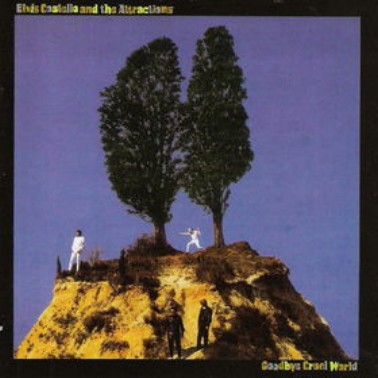
The Front Cover
Costello defines this album as his worst ever. After listening to it attentively, I dare say it was (up to that point in his career, 1984) the album that was approached the worst. Some of the material holds well under scrutiny, but the fact that the best songs are segregated on the first side does lead to an exhausting listening experience.
The album’s leading single was actually a mildly successful one – “The Only Flame In Town” broke the Top 40 in the US, largely because it came on the heels of “Everyday I Write The Book” and it replicated the formula to a hilt.
As I said, the best music comes at the beginning – “Home Truth”, “Inch By Inch” and (especially) “I Wanna Be Loved” and “Worthless Thing”. The latter is a forerunner to Costello’s “rambling” lyrics like “Tokyo Storm Warning” and “Bedlam”, only that it is more ordered. And (as you know) I have a soft spot for “Love Field”.
The whole of the second side, now, slides downhill constantly. The remastered CD actually has a demo of one of these songs (“The Deportee Club”, renamed “Deportee”) that is far more approachable. Speaking of which, the remastered CD includes “I Hope You’re Happy Now” and the catchy “Turning The Town Red”, not to mention two salient covers: “Withered and Died” and “Baby It’s You”. The CD is rounded by a slew of live songs – “Worthless Thing” and “Motel Matches” work, while the cover of “Sleepless Nights” reminds us that nobody sings like the Everly Brothers. And the live “The Only Flame In Town” is an absolute highlight. Costello plays it solo (like all the other live cuts), and in this context the song turns menacing and even disturbing.
As you can tell from the above, the album is a true mixed bag in terms of compositions and performances. But the most aggravating aspect of “Goodbye Cruel World” is the actual production values. In a nustshell, it stands now as everything that was wrong about ’80s music, with Steve Nieve playing an incongruous amount of keyboards and synthesizers. Costello now regrets employing the same set of producers on this and the previous record. When this album was released he also started changing the way he always wrote, relying less on wodplay and puns. In fact, he also announced his first ever retirement at around this time. Everything was changing for him – he must have perceived that (notwithstanding his recent American successes) he was sliding out of the picture. He was no longer a new, young sensation and he must have felt unsure about how to proceed best. He would reignite himself artistically shortly, but the charts were to remain mostly aloof to him from this point on.
Rating: 5/10

Pingback: Elvis Costello – General Introduction | MusicKO